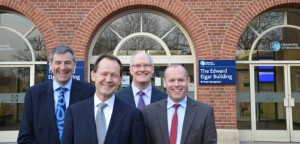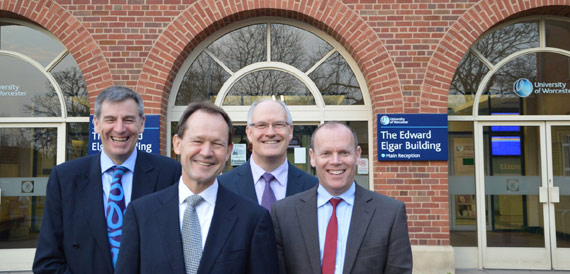 The Institute of Directors is lobbying hard on three main issues, the Director General Simon Walker told an audience of business men, women and students at Worcester Business School.
The Institute of Directors is lobbying hard on three main issues, the Director General Simon Walker told an audience of business men, women and students at Worcester Business School.
Giving the annual IoD lecture at the University of Worcester, Mr Walker spoke about the role of business groups in influencing Government.
He said that every day of the year the IoD was working on extending the influence of the business community.
“There is an extensive list of things which we and our 35,000 members would like to see change in Britain.
“But there are three top line issues we are working on at the moment,” he said.
These included the infrastructure of the British economy.
“Our business people are some of the best in the world, but without the right infrastructure to work within their efforts will always be denied the full success they deserve.
“Infrastructure involves the traditional classic projects – physical requirements like new airport capacity, reliable trains and decent roads.
“But it also means more intangible assets such as affordable energy, fast broadband and an open migration system,” he said.
The second major issue is one of economic confidence.
“Our research shows that it is not only nervousness about economic prospects that deters investment and spending by business, it is also the uncertainty created by patchy Government policy making.
“For example, our polling shows that half of our members feel that politicial decisions in Westminster are major driver of short termism,” he said.
“The third and final issue is by far the largest. It concerns the future of capitalism and the free market itself.
“We acknowledge that the financial crisis, various scandals from LIBOR fixing to rewards for failure and the ongoing difficulty in returning the economy to growth have severely knocked public faith in our economic system.
“That has led some politicians to be opportunist – attacking business because they think the electorate will reward them for it.
“It has also offered opportunities for those who have always hated private business to have another go at selling their anti-capitalism to a disillusioned public.”
He said the IoD had a responsibility not just to challenge unjustified attacks, but also to promote positive reforms to how capitalism works.
“I am proud that our organisation has been bold enough to stand up on behalf of ordinary business people and object to a culture of excessive rewards for failure in some financial institutions.
“I am proud that we were a leading voice in support of last year’s shareholder spring, and that we have contributed to the Cox Report into solving the problem of short-termism.
“In short, I thnk we produce real, positive changes, not just for business in the UK but for the nation as a whole. Britain is socially and financially better off for having a strong private sector.
“But the challenge is never over. For every success we have had, there are 100 other issues which need to be addressed,” he said.
He was welcomed to the University of Worcester by Vice Chancellor Professor David Green, and Mark Richardson, head of Worcester Business School.
He was thanked for his speech and his frankness in the following question and answer session by Francis Christie, chairman of the Hereford & Worcester branch of the IoD.



















